All the statements below have one thing in common: they are all untrue! Sadly, some of them are so widespread that your child may not only have heard them, he/she might even believe that they are true.
Read on to see why these myths are untrue:
The real facts
- Changes in daily routine and diet can cause constipation
- Mood can affect the bowel
- A low-fibre diet can lead to constipation
- Staying hydrated helps
- Exercise helps
Travelling can alter your child’s daily routine, and may lead to constipation. As a preventive measure, give him/ her plenty of water to drink and encourage him/her to walk around during plane transit times or when taking rest-stops along the trip. Take note that it is also common for toddlers transitioning from liquid-to-solid foods to experience constipation.
Studies have shown a link between emotional stress and how well the gastrointestinal system functions. Your child may become constipated if he/she feels anxious about something, like starting at a new school or if there are family conflicts.
Fibre helps provide bulk to your child’s stools, and is needed to help the bowels move properly, thus eating too little fibre can cause constipation.
Constipation can be caused by dehydration because liquids help soften stools and ease their movement along the bowel. So to avoid dehydration in your child, he/she needs adequate water-intake daily.
Physical activity helps to regulate bowel movement, so get your child up and moving.
In most cases, constipation isn’t a serious cause for concern in children. It is highly preventable and easy to remedy. Make sure your child drinks plenty of water and eat more foods that are rich in fibre like fruits, vegetables, beans and whole grain bread. Encourage your child to get enough exercise. Create a positive home environment to improve your child’s mood and bowel functions. All this would help to ease bowel movements.
There are times when constipation may be due to diseases so if in doubt, seek the advice of your doctor.






Comments